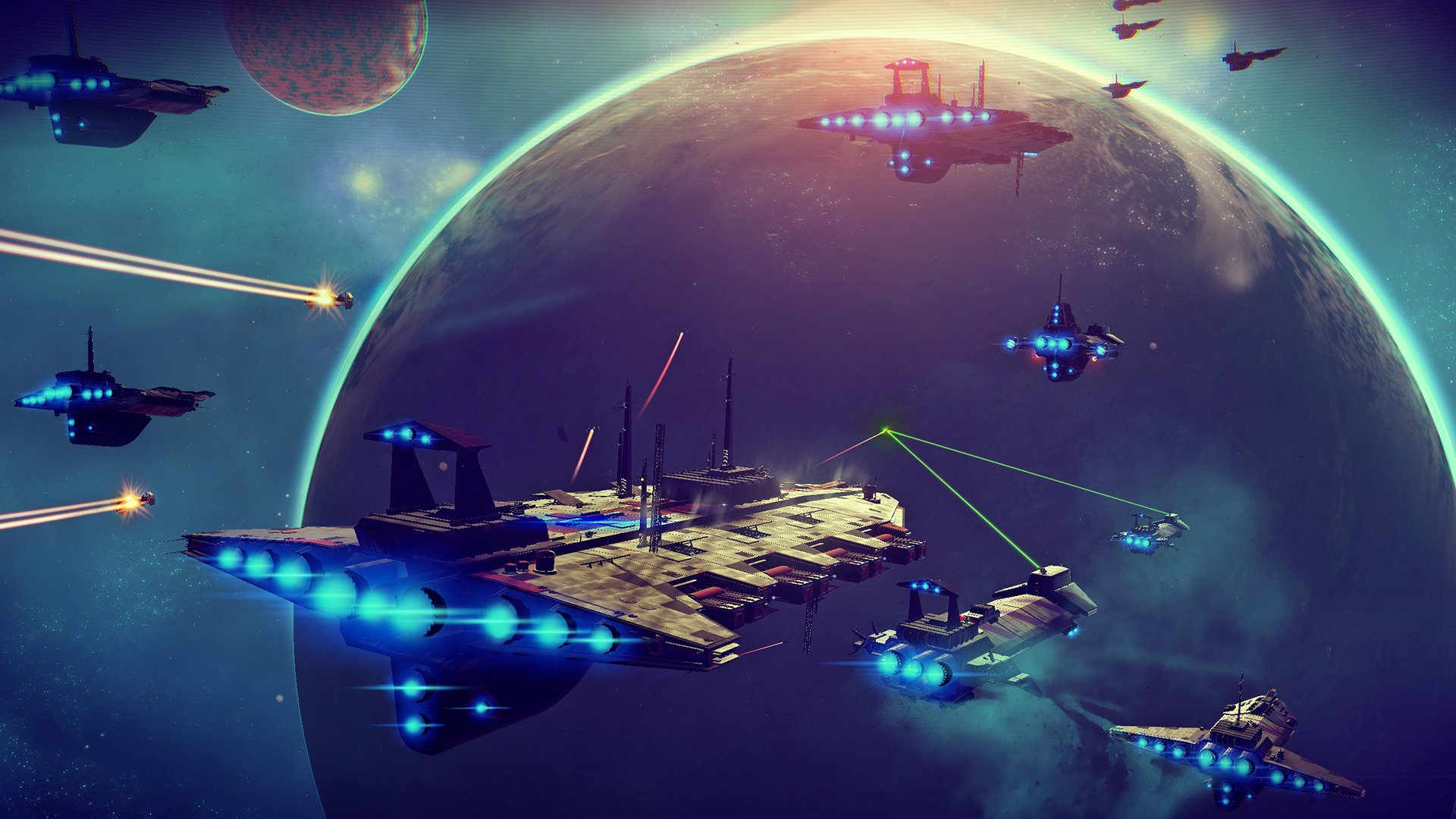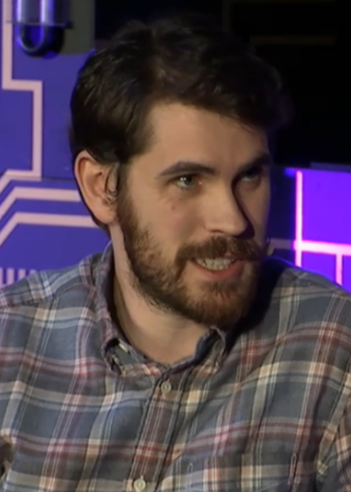Sean Murray: No Man's Sky's NPCs won't make you fetch "space-chickens"

“How do you know it all works?” I ask Sean Murray of Hello Games, developer of No Man’s Sky. It’s a question I’ve been struggling to put into words throughout our interview, but I’ve run out of time and just have to blurt it out. No Man’s Sky procedurally generates a galaxy of some 1.8 quintillion planets, and even if the game attracts millions of players who spend months exploring, most of the galaxy—99.9% according to Murray—will never be seen. Murray himself has only seen a tiny fraction of the possible universe the game generates, so with players beginning in random spots on random planets in a random part of a galaxy that has never been examined, well… how does he know it all works?
He doesn’t.
“I have had to make my peace with the fact that there are…” Murray trails off for a moment. “And I know this sounds bad, but there are bound to be balance-breaking planets out there, that one player will find a way to get rich quick, right? And I think that’s sort of cool. I think that is a story, and that person can talk about that. Because every player starts on a different planet, and somebody can start up and find some incredibly rare technology just straight off the bat.
“And that’s kind of nice. And then it becomes their quest to build that [tech], you know, and also they can talk about it online and everyone can be, like, “Oh my god, we have all been searching for that!” Somebody saying, like, “I’ve searched for months and I haven’t found that, and I hate you now!”
We don't have base-building. And the reason is, it would just make people want to stay where they are and not explore.
One of the surprising things we saw earlier during the No Man's Sky presentation were intelligent alien NPCs that players can trade with and interact with. The more you encounter these aliens, the more words you learn in their language and the easier it becomes to deal with them. Murray hasn't really talked about NPCs until now: he wanted to wait until they were working properly before discussing them. He's not interested in the typical quest-giving NPCs found in other games, either.
“My mindset at the time was that I visualize NPCs in most games and they feel a little bit empty a lot of the time," he says. "They sit outside their shop, day and night, it doesn't seem to matter, they don't seem to be aware of what's going on. You will come up to them and you will be drenched in blood and they will still just talk to cheerily to you, you know?
“And they will tell you: go and collect my three chickens, or whatever. And that, when you spread that out across the universe it doesn't really make as much sense, you know? And you see the strings way more clearly. And what we've settled on, and what it's taken us a long time to get to work well, and I feel it does, is something that I feel is true to the science fiction experience. Learning alien languages, trying to communicate with aliens you don't quite understand. And, being able to trade with them, being able to gain new tech from them, that kind of thing.
Keep up to date with the most important stories and the best deals, as picked by the PC Gamer team.

Sean Murray at the PC Gaming Show in 2015.
“They don't say to you: I've lost my three space chickens, go and find them, they're on the three planets of this solar system. It would be so easy for us to do that but it feels like such a wasted opportunity and it feels like that's kind of something that other games do far better, that suits other games far more. And it's never something that I have personally super-enjoyed or looked forward to.”
Restlessly exploring brand new places in games is exciting, but I also think there’s something that goes hand-in-hand with it, at least for me: coming back home. There’s a particular comfort in exploration games, I find, in returning to someplace familiar after a long trip, in spending so much time in one small corner of the game you begin to know it intimately. I ask Murray if No Man’s Sky is a game that only pushes players deeper and deeper into the unknown, or if there’s also room for players who want to find a spot to call home. In fact, Murray tells me he’s already seen players in No Man’s Sky who want to settle in for a while rather than make a hyper-speed dash for the horizon.
“We do find people in playtests just staying on a planet for far longer than I would have expected. And that's cool, I like that. Even in doing demos and stuff like that, which are quite short, you find people finding a hazardous planet, and they just want to see how long they can survive on it. Or you find people being on a hazardous planet, and then they go to a really lush planet, and they feel like ‘This is nice! I just want to hang out here, I want to chill,’ and that's good as well. They have their own way of playing games and their own particular play style and then they find a planet that suits that better and gives them the experience that they want, and they'll settle on that for a little bit. And they might stay a few hours there and they might decide to move on.”
I think this is a huge canvas that could support lots of different ways of playing the game.
No Man’s Sky, however, is built specifically to push players to find new places rather than encouraging them to get to know any one place in particular.
"In terms of features,” he says, “in terms of design, decision-making, and stuff, we always say ‘Does this encourage exploration or does it not?’, basically. And we use that to cut out features. So things like base-building: we don't have base-building. And the reason is, it would just make people want to stay where they are and not explore. And we've built this whole huge universe, and that would be a shame! We want them to go out and explore. Or, for instance, each planet could contain loads of different biomes within it, we could have polar ice caps, and all that kind of thing, but then it wouldn't make you want to go and visit other planets. So we don't have that, and that's really purposeful, and that's our kind of vision for the game.
“Now after it comes out, you're right, maybe people will say ‘Hey, I just want to settle down and go fishing.’ And you know, maybe we'll support that then if there's enough of those people. Right now, it is about pushing people far apart, it is about exploration. And I think that's cool, that's the vision that we have. But I think this is a huge canvas that could support lots of different ways of playing the game.”
By support, he’s talking about post-release updates. While Murray has no plans for DLC, he does talk about the possibility of someday updating No Man’s Sky with new features, mostly based on how Hello Games sees people playing their game.

“There's things, post-release, that would be really exciting for the game that we could see how people were playing and iterate on that. This is definitely a game for updates. And actually, content-wise, DLC is less applicable. Actually, the model that we're going for is a model that is way more common on PC [than on console]: a constantly iterated and growing feature set, and that's something we would love the opportunity to support.
“I can’t promise that, obviously, because maybe no one will play No Man’s Sky, and maybe everyone will hate it, and maybe Hello Games will go out of business.” He laughs. “But if people will allow us that opportunity it's something I would love to do."
No Man's Sky is priced at $60, and will be released on June 21, with pre-orders beginning today. Also check out our hands-on impressions of No Man's Sky.

Chris started playing PC games in the 1980s, started writing about them in the early 2000s, and (finally) started getting paid to write about them in the late 2000s. Following a few years as a regular freelancer, PC Gamer hired him in 2014, probably so he'd stop emailing them asking for more work. Chris has a love-hate relationship with survival games and an unhealthy fascination with the inner lives of NPCs. He's also a fan of offbeat simulation games, mods, and ignoring storylines in RPGs so he can make up his own.

